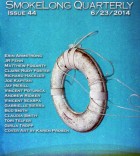Vincent, your story was a real joy to read, so lush and powerful, hypnotic, even. Please tell us a bit more about “Jimmy O’Jimmy.” It’s a poetic stream of consciousness story about a red horse, self-discovery and the wandering minds of adventurous youth. To pull a quote, “there’s nothing wrong with a mind that likes to run.” Where did this story come from, and is it based on any of your own personal history?
Thank you for your kind words, Richard.
I wrote “Jimmy O’Jimmy” a couple summers ago when I was trying to write at least one story each day. “Jimmy O’Jimmy” was one of those stories. I try not to know where a story comes from. I try to follow the Surrealist dictum: first thought, best thought. Then I try to organize the intuition into something that feels right.
In regards to “personal history,” I lived in Minnesota on-and-off for about five years. During the last stretch of time that I lived there, I rented a cabin on a horse farm in a very rural area. Sometimes I talked to the horses. Maybe this story comes from those conversations.
Is this style of storytelling how you usually write your fiction, or is this a new technique, this long exhalation of story, emotion and history?
Every story is different, but I wrote a number of these relentless pieces when I was under the heavy influence of Thomas Bernhard and W.G. Sebald. For the last year or so, I’ve been writing mostly about The Future while listening to Blink 182’s Dude Ranch on repeat.
Many of the flash fiction submissions we got this past week were simply short stories, fiction under 1,000 words, but they didn’t really seem to understand that flash fiction is not short, it’s condensed, it’s reduced (to use a cooking term). The best examples, in my opinion, never waste a word, giving us history in every scene and gesture, showing us the emotion, the world view, so that we don’t feel cheated; in fact, we feel as if we have swallowed a much larger narrative in a shorter span of time. I liken it to prose poetry. Can you tell us your thoughts about flash fiction in general?
Lydia Davis says much smarter things than I can say about the sometimes slippery distinction between “poem” and “story” in this Believer interview (which includes a dope list of writers who don’t fit neatly into either category—I’m a big fan of Davis as well as several of the writers she lists, especially Robert Walser and Henri Michaux).
I noticed that you’ve written other flash fiction, had work up at FRiGG, for example. Is that a preferred length for you? Do you write other short fiction, longer short stories? Are you perhaps working on a novel yet? (Isn’t that what they always ask?)
I was writing really short pieces for a while. Then I was writing poems. Then I wrote a short “novel” about a clone starring in a reality show. Now I’m trying to write one story and one poem per week. I love Ray Bradbury who wrote a story almost every week of his life, so I’m just copying him. The more I write, the lighter I feel.
You’re getting your MFA at the University of Florida. How is that influencing your work? Do you enjoy the community and process?
I was very skeptical about, even against, getting an MFA, but, like most things I’m initially skeptical about, I was just being close-minded. MFA@FLA (what we call our program here) has given me many gifts: health insurance, classes to teach, fellowship money, support and guidance from writers I deeply respect, and, most importantly, lots of paid time to write (three whole years), which I’ve tried to take maximum advantage of. I was essentially given a sort of residency in a cool town. I also met my soon-to-be wife here. Writing became something I’m no longer ashamed of or feel guilty about doing.
What’s next for you? Any other big announcements, anything on the horizon?
As of this week, I’m now finished with my MFA degree. I’m also done teaching, which I’m a little sad about. I’m getting married in August. My soon-to-be wife and I are moving (we think) back to Southern California after we do some travelling. Then I need to find more stable income. Overall, I feel pretty happy.


